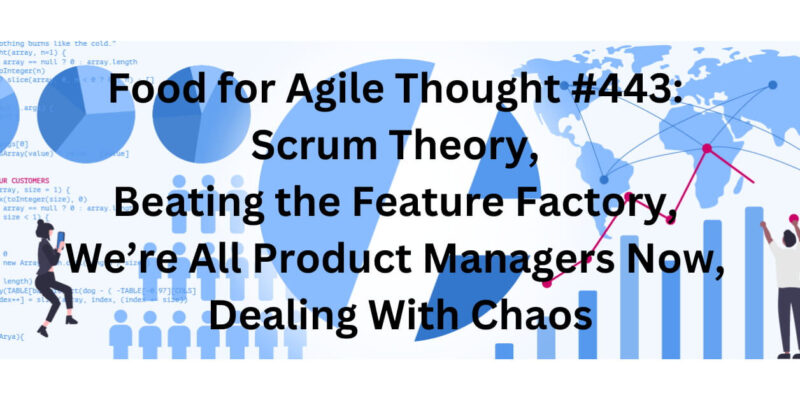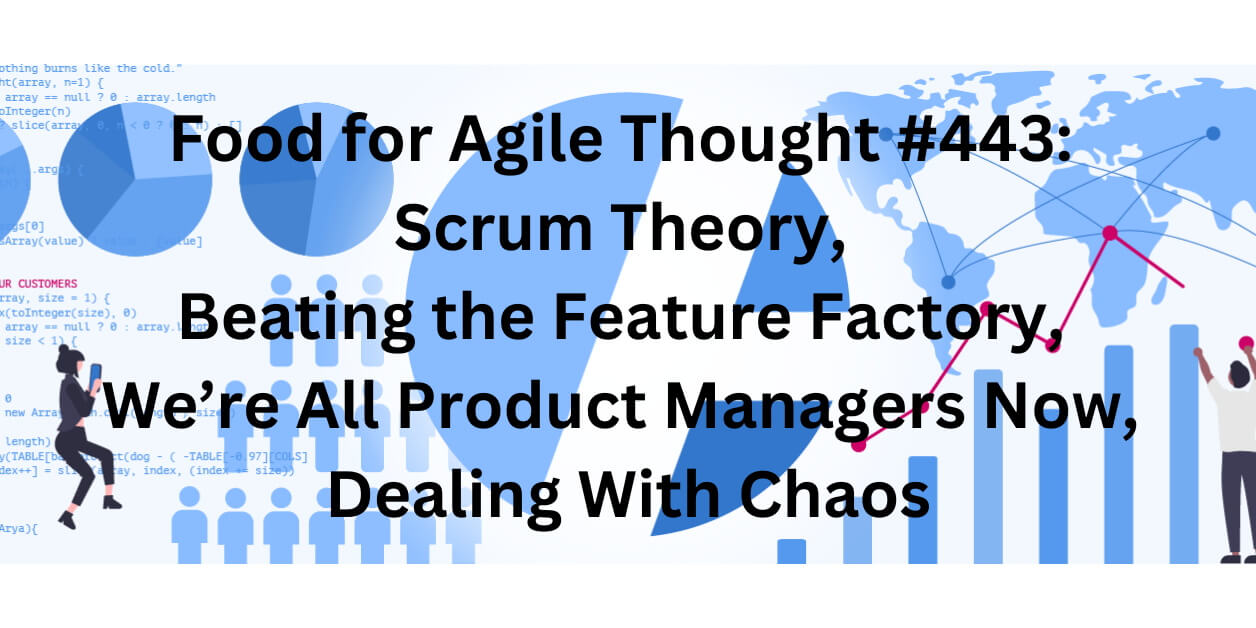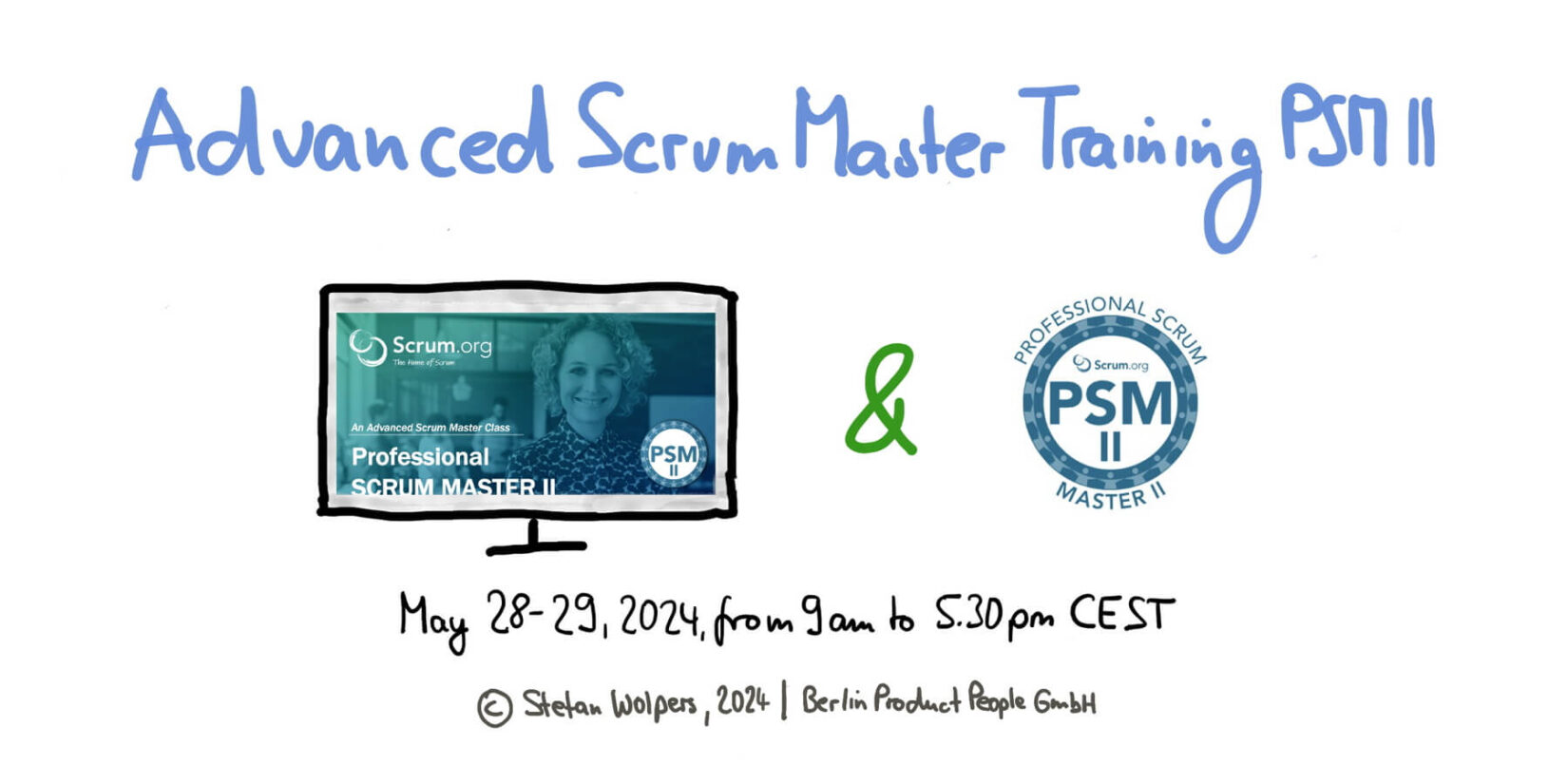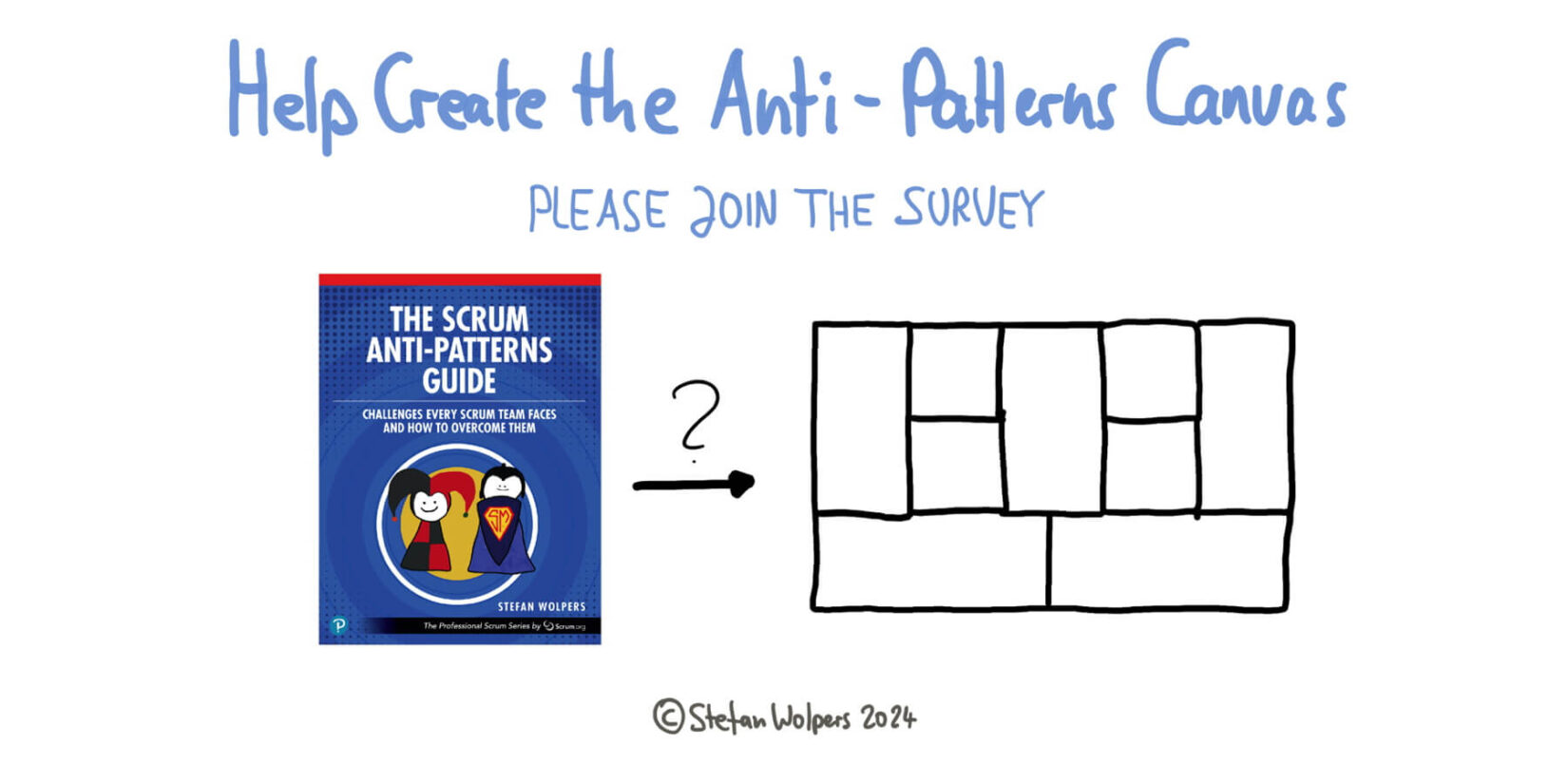TL; DR: Scrum Theory — Food for Agile Thought #443
Welcome to the 443rd edition of the Food for Agile Thought newsletter, shared with 42,551 peers. This week, Francis Laleman reconsiders Scrum theory, appreciating its robust foundation in empiricism and lean thinking, and Jeff Putz advocates for Agile’s practical value over procedural adherence. Also, Todd Lankford outlines steps to enhance team autonomy and leadership. Verena Schwarzer discusses Agile’s challenges in large organizations, while Chris Matts critiques superficial Agile implementations, particularly the ineffective “Go/No Go” meetings that typify “Agile Kabuki.”
Then, Melissa Perri and Stephen Bungay apply military tactics to product management strategy, discussing daily challenges and solutions, and David Pereira and Maarten Dalmijn advocate for impactful, humble planning over quantity to escape the feature factory trap. Moreover, Michael H. Goitein highlights strategy as crucial for business agility, citing Nokia’s focus on Agile without a strategic foundation as a cautionary tale. Jeff Gothelf argues for unifying roles in product development, suggesting everyone should be a product manager to enhance collaboration.
Lastly, John Cutler interviews Gene Kim about his latest work, ‘Wiring the Winning Organization,’ focusing on simplification and impactful change themes. Lena Reinhard offers strategies for leaders to manage overwhelming workloads, and Simone Cicero presents a manifesto for adaptable, innovative platform organizations suited for the 21st century. Also, Shane Parrish discusses how the differing schedules of Haruki Murakami and Gary Vaynerchuk reflect their unique professional demands. Finally, Andrew Chen critiques the tech industry’s “Dopamine Culture,” highlighting the challenge of balancing instant engagement with lasting retention.
🎓 July 1, 2024: The Advanced Product Backlog Management Course for Just $99!
👉 Please note:
- The course includes membership in a new community of agile professionals.
- Become fully reimbursed if you choose to join the Advanced Product Backlog Management Cohort of June 13-July 11, 2024, at € 399.
- The course will only be available until July 8, 2024, for sign-up!
The most popular discussion on LinkedIn last week was: What is a “full-stack” Scrum Master?
Did you miss the previous Food for Agile Thought’s issue 442?
🗞 Shall I notify you about articles like this one? Awesome! You can sign up here for the ‘Food for Agile Thought’ newsletter and join 42,000-plus subscribers.
🎓 Join Stefan in one of his upcoming Professional Scrum training classes!
🏆 The Tip of the Week: Scrum Theory
(via Medium): About the Theory of Scrum. (according to The Scrum Guide)
Initially, Francis Laleman dismisses Scrum as flimsy due to its simplicity but later realizes its foundation on empiricism and lean thinking provides a robust framework for adaptive, value-driven teamwork.
🍋 Lemon of the Week
(via CIO.com): Scrum master certification: Top 13 certs for agile pros
The authors claim a Scrum Master certification proves your ability to lead Agile teams. They list the top 13 certifications but fail to mention that true agility isn’t about certificates.
➿ Agile & Scrum
: I was wrong about ‘agile’ software development
Jeff Putz reflects on Agile software development, criticizing its formalized processes and advocating for practical, value-driven approaches that prioritize delivery over ceremony and emphasize adaptability, estimation accuracy, and context.
(via Medium): How I Overcame a Toxic Management Belief to Unleash Team Autonomy
Todd Lankford shares five steps to build a problem-solving culture by promoting team autonomy: celebrate problems, visit team spaces, model problem-solving, practice collaboratively, and implement intent-driven leadership.
(via ThoughtWorks): Ineffective scaled agile: How to ensure agile delivers in complex systems
Verena Schwarzer highlights the challenges of agile delivery in large organizations, recommending avoiding technical-focused requirements, aligning team structures with value creation, empowering product owners, and tracking outcomes through lightweight governance.
(via Boundaryless): A Manifesto for the Platform Organization
Simone Cicero outlines a manifesto for platform organizations, emphasizing four beliefs and eleven design principles to foster adaptability, innovation, and an entrepreneurial spirit, which are essential for thriving in 21st-century markets.
🎓 🖥 🇬🇧 Advanced Professional Scrum Master Training w/ PSM II Certificate — May 28-29, 2024
Discover Scrum’s four success principles in this official Scrum.org class for Advanced Scrum Masters, including the industry-acknowledged PSM II certification. This PSFS training class is in English.
Enjoy the benefits of a live virtual immersive class with like-minded agile peers from 09:00 – 17:30 CEST.
Learn more: 🖥 💯 🇬🇧 Advanced Professional Scrum Master Training w/ PSM II Certificate — May 28-29, 2024.
Customer Voice: “Since about 12 people have already asked me these last 2 days: Yes, taking one of Stefan Wolpers’ classes is a mind-blowing experience. He’s actually the most adroit facilitator I’ve met after Guy Kawasaki & Roland Busch. It all flows like a silk ribbon in a soft spring breeze but with a strong authenticity that prevents the thing from feeling all Del Monte Canned Corporate Facilitation(tm). It may be due to his seemingly effortless mastery of the Liberating Structures. He doesn’t “teach to the test,” yet when you take the open practice assessments; you somehow score 95+ the first time. I dunno, it’s magic or Mozart, you pick.” (Source.)
👉 From time to time, we can offer last-minute seats for training classes at cost to individuals who do not have access to a corporate training budget. If you would like to be notified about these opportunities, please register here.
🎯 Product
and (via Produx Labs): 🎙 Applying Military Tactics to Strategy Execution with Author Stephen Bungay
Melissa Perri and Stephen Bungay discuss applying military tactics to strategy execution, addressing everyday struggles and solutions for product management teams.
and : 📺 How Humble Plans Can Beat the Feature Factory
David Pereira and Maarten Dalmijn discuss how humble planning and focusing on impact over quantity can help product teams overcome the feature factory mindset. They emphasize proactive relationships, focused Sprint Goals, and fast iteration.
(via Medium): Here’s why Strategy, not Agile, is the missing key to Business Agility
Michael H. Goitein argues that strategy, not Agile, is key to business agility. Nokia’s downfall illustrates how focusing solely on Agile can lead to failure without a solid strategic foundation.
: We are all product managers now
Jeff Gothelf argues that dividing roles between product managers, Product Owners, and business analysts reduces collaboration and shared understanding. Today, everyone involved in product development should be considered a product manager.
📯 Help Create the Anti-Patterns Canvas
Join me in developing the Anti-Patterns Canvas, a dynamic and free tool that extends the insights of the “Scrum Anti-Patterns Guide” book. Share your expertise through the survey, see below, and test-drive tools, practices, and exercises through a series of upcoming Hands-on meetups. In other words, help me create a resource that enhances agile practice and value creation.
👉 Join the Anti-Patterns Canvas survey here.
🛠 Concepts, Tools & Measuring
and : 🎙 Sociotechnical Maestros
John Cutler interviews Gene Kim. They discuss his latest book ‘Wiring the Winning Organization,’ co-written with Steven Spear, and its impactful themes of slowification, simplification, and amplification.
(via The New Stack): Dealing With Chaos: A Guide for Leaders Feeling Overwhelmed at Work
Lena Reinhard provides tips for leaders feeling overwhelmed by urgent tasks, constant meetings, and high ambiguity. She suggests identifying core needs, managing energy, and seeking support to handle chaos effectively.
(via Farnam Street): Maker vs. Manager: How Your Schedule Can Make or Break You
Shane Parrish contrasts the schedules of novelist Haruki Murakami and entrepreneur Gary Vaynerchuk to illustrate how different work requires different time management strategies for success.
: Failureship and Risk Management Theatre
Chris Matts highlights “Agile Kabuki,” where agile techniques reveal issues but are ignored, exemplified by “Go/No Go” meetings that delay progress without real impact, showcasing ineffective risk management theater.
🎶 Encore
: How novelty effects and Dopamine Culture rule the tech industry
Andrew Chen explores how the tech industry’s “Dopamine Culture” and novelty effects drive short-term engagement but often result in poor retention, urging tech products to balance instant gratification with long-term usefulness.
📅 Scrum Training & Event Schedule
You can secure your seat for Scrum training classes, workshops, and meetups directly by following the corresponding link in the table below:
See all upcoming classes here.
You can book your seat for the training directly by following the corresponding links to the ticket shop. If the procurement process of your organization requires a different purchasing process, please contact Berlin Product People GmbH directly.
📺 Join 5,000-plus Agile Peers on Youtube
Now available on the Age-of-Product Youtube channel to improve learning, for example, about Scrum Theory:
- Hands-on Agile 61: Toyota Kata Coaching for Agile Teams & Transformations with Fortune Buchholtz.
- Hands-on Agile 59: Tackling Fake Agility with Johanna Rothman.
- Hands-on Agile 57: Humble Planning with Maarten Dalmijn.
- Hands-on Agile 54: Overcoming Common Product Backlog Management Traps with David Pereira.
- Hands-on Agile 53: An Agile Coaches Guide to Storytelling with Bob Galen.
- Hands-on Agile EXTRA: How Elon Musk Would Run YOUR Business with Joe Justice.
✋ Do Not Miss Out and Learn About Scrum Theory — Join the 19,000-plus Strong ‘Hands-on Agile’ Slack Community
I invite you to join the “Hands-on Agile” Slack Community and enjoy the benefits of a fast-growing, vibrant community of agile practitioners from around the world.
If you like to join all you have to do now is provide your credentials via this Google form, and I will sign you up. By the way, it’s free.
Help your team to learn about the Value-Add Activities Metric by pointing them to the free Scrum Anti-Patterns Guide:









